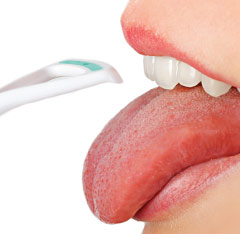Tongue Scraping
Tongue scraping to stop bad breath
Dear Doctor,
 Can you tell me if there's any real value in tongue scraping to stop bad breath?
Can you tell me if there's any real value in tongue scraping to stop bad breath?
Dear Ellen,
Bad breath — “halitosis” (from halitus-to exhale, osis-condition or disease) is very common affecting millions. In most cases the cause is local, which means it starts right in your mouth. Oral malodor is the result of the action of specific types of bacteria, which produce a range of substances including volatile sulphur compounds, (VSCs), responsible for the bad egg or rotten fish smell. Although often associated with the presence of periodontal (gum) disease, in many cases, the evidence points to the importance of bacteria in tongue coatings as a cause of bad breath. Controlling oral malodor is aimed at reducing the bacterial population both in periodontal disease and in tongue coatings with proper oral hygiene measures, including control of tongue bacteria by brushing or scraping, and possibly the adjunctive use of antiseptic agents.
It is clear that the tongue forms the largest niche in the mouth for harboring bacteria. There is more tongue coating in those complaining of bad breath than those who don't. Cleaning the surface of the tongue on a regular basis, particularly directed toward removing the coating, has been found to be fruitful in reducing bad breath.
Scraping your tongue may help you reduce bad breath!
Is there any value in tongue scraping? On the basis of literature, there appears to be no data to justify the necessity to clean the tongue on a regular basis, except if there is oral malodor, in which case the tongue surface must be kept free of coating, so brushing or scraping needs to be repeated on a daily basis.
Brush or scrape? — findings indicate a small but statistically significant difference in reduction of bacteria responsible for bad breath when tongue scrapers are used rather than toothbrushes to reduce halitosis in adults.

